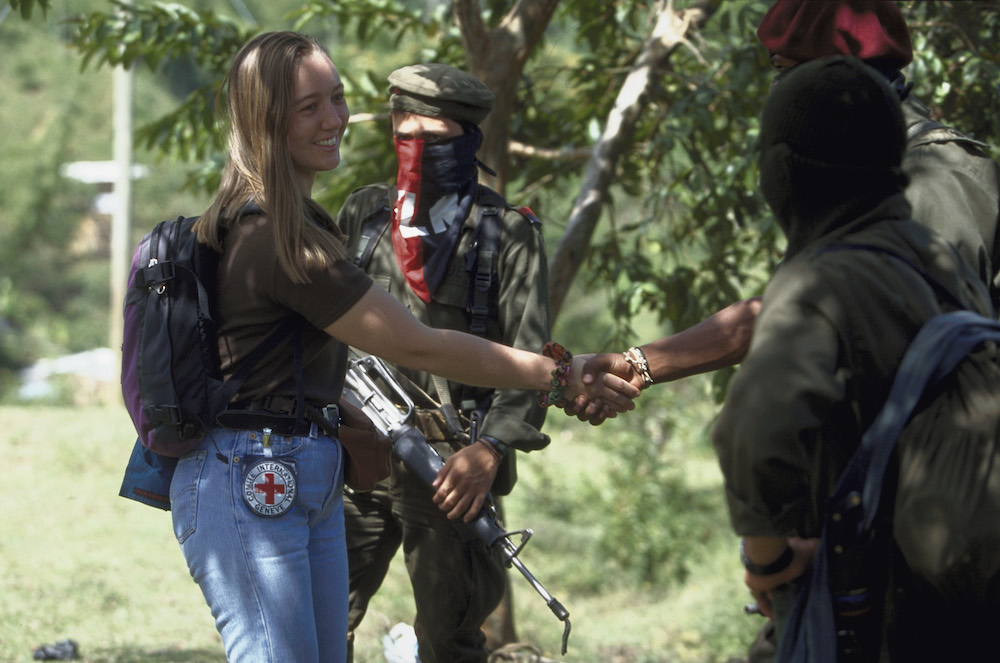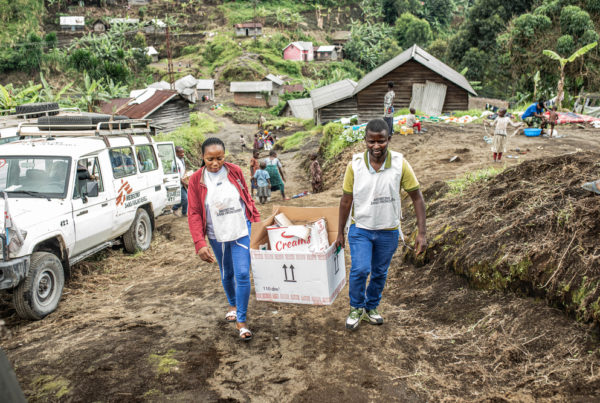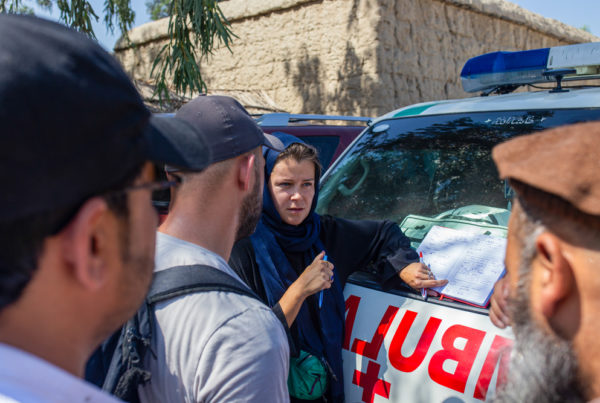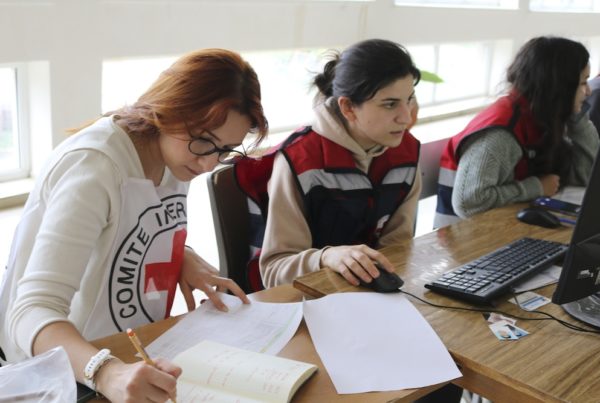
Almost half of humanitarian workers worldwide are women, and this number keeps growing every year. In 2022, 49% of the highest-paid jobs in UN agencies were held by women, and 61% in international non-governmental organisations. Clearly, women have a seat at the negotiation table. And yet, they still face many obstacles along the way to achieving professional success.
The Centre of Competence on Humanitarian Negotiation spoke with Liesbeth Aelbrecht (former General Director of Médecins Sans Frontières Switzerland), Bernadette Castel-Hollingsworth (Deputy Director of the Division of International Protection at the UN High Commissioner for Refugees), Joyce Kanyangwa Luma (former Director of Human Resources at the World Food Programme), Dr Asha Mohammed (Secretary-General of the Kenya Red Cross) and Parvathy Ramaswami (former Humanitarian Coordinator ad interim and Deputy Country Director for the World Food Programme in Afghanistan).
Here is what these five high-level professionals shared about what they wanted to achieve as humanitarian professionals, their thoughts on the obstacles women face in the humanitarian sector and what we can do to level the playing field for other women humanitarians.
What women negotiators want
1. Women want to continue working at the frontlines of humanitarian action
Joyce Kanyangwa Luma explains that women have always negotiated at the frontlines—we just never recognised them as “negotiators.”
Female humanitarians have particular strengths. For instance, they can often interact with difficult counterparts without being perceived as threatening. In fact, Joyce Kanyangwa Luma thinks strong and experienced female negotiators may even be better suited to work in the most difficult operational contexts.
2. Women want to have opportunities to grow professionally
Today, more women are applying for jobs in difficult humanitarian operations, and for more senior positions like country director as well as junior positions, explains Joyce Kanyangwa Luma.
People used to perceive high-risk and emergency operations as being mostly dominated by men—which is not the case anymore, she explains. However, there needs to be more support from other women to empower them to take up field positions.
“I encourage most women to go to the frontline. It is the place where you learn. You do not learn to be a humanitarian at the headquarters. It is really by going to the deepest field where you understand the issues at stake and what needs to be done to reach the most vulnerable people. […] If you want to be a real humanitarian, go to the field! Humanitarian work is about problem-solving and dealing with human issues, you do not learn that from a textbook,” she emphasised.
3. Women want to be able to choose what to do with their lives
Liesbeth Aelbrecht highlighted that women wear many different hats—as people, as humanitarians, and as professionals. These roles are intertwined, especially for women who work in the field.
“If you want to have a family, if you’re a mother, I can tell you that anything is possible if that’s what you want. It’s the choice you make. Don’t let anyone tell you otherwise. It’s up to us to make things happen. These roles can all be combined.”
The obstacles women face
1. Women must deal with rigid gender roles
Dr Asha Mohammed observed that women may not be given the chance to work as negotiators because of a false perception that they are soft, tend to give in easily and are unlikely to get the best outcome.
She has noticed that men may be primarily recruited for work carried out in areas that are dangerous or not easily accessible, whereas women are not considered for those positions because of their other responsibilities, such as childcare.
The ability to break down gender stereotypes about dangerous and technical field tasks allows women to take more responsibility and senior roles, explains Liesbeth Aelbrecht.
She calls on her female colleagues to not partake in reinforcing these stereotypes but proactively demonstrate that they too can handle roles historically dominated by men.

Isabel
Humanitarian worker
My gender and being young-looking are key factors in the cultural context in Bangladesh. They think: “What possible experience could she have?” Plus, I have a “baby face”, so regardless of my experience, I have that against me.
Read more
I go in being hyper-aware of this. I am definitely changing my personality, trying to be more polite and culturally sensitive. Being aware of how much is going against me, as opposed to against my male colleagues.
There are so many patriarchal norms here that are so ingrained. It’s an issue of credibility. I generally feel that being a woman here is more of a disadvantage. I have gone to negotiations with my supervisor, who is older but still female. And the reaction she gets, it is the same kind I get, where they want to put you in your place: “How old are you, you look too young. Are you married? Do you have kids? What are you doing here if you have kids?”
I remember once that I went to negotiate access to the camps during Covid, to open our facility to do minimum services. The local authority immediately asked where my male colleague was. Male managers get away with not having to manoeuvre like I do. They have an added credibility automatically by being older and male. However, knowing how Bangladeshi women are treated, they have it harder than me. Being international, and European in particular, helps.
In some scenarios, I have been able to negotiate services better by having a softer approach and being more polite, being more aware of the cultural context, not getting impatient or easily frustrated. But these are the exceptions to the rule. I’m married, so I try to play the young mother card to build more trust. Somehow being married gives you a little more respect—playing up to being a family woman, a “good” woman.
“What are you doing here if you have kids?”
Over the course of 2021, the CCHN collected stories that illustrate how the identity of the negotiator and the counterpart can influence the negotiation process. Frontline negotiators shared how their gender impacted their negotiation. This is one of the stories we captured.
2. Women aren't always taken seriously
Liesbeth Aelbrecht concedes that female negotiators may not be taken seriously at first. She shares that on occasion, even as the highest-ranking team member, she has been mistaken as a notetaker during negotiations.
However, she stresses that this can be used as a negotiation tactic or simply leveraged to ease tensions or build relationships while not being in the spotlight at the negotiation table. Communicating with counterparts builds trust and confidence, allowing them to move past these stereotypes.
3. Women lack opportunities to lead high-stakes negotiations
Reflecting on her experience in negotiations, Dr Asha Mohammed thinks that women have not been given the space and opportunities to take part in many high-stake negotiations due to false perceptions informed by gender stereotypes, such as that women are soft or tend to give in easily.
For her, it’s crucial that female negotiators continue to build their skills and she believes they should be supported to do so.
4. Women lack support from colleagues
In Parvathy Ramaswami’s experience, the counterpart will look at the team’s strength in terms of what it brings to the table—that is, the content, the principles, and red lines—but not so much at the fact that they are negotiating with a woman.
When teams are comprised of both men and women, but its members don’t value women and men equally, the other party can notice this behaviour and use it to undermine what the women negotiators say.
“That’s why it’s very important to clarify each team member’s role and feed off of each other’s strengths, rather than competing,” highlighted Parvathy Ramaswami. “It’s very important to show unity, cohesion, and equity among team members.”
What can be done?
At an individual level...
1. Build confidence
In Liesbeth Aelbrecht’s experience, women need to build their confidence so they can take that one step further to get a better deal in negotiations: “When you have everything on the table, you need to see how far you can go. That may make a huge difference to your beneficiaries. I’ve learned how much of an advantage it can be.”
2. Develop your (negotiation) skills
In Dr Asha Mohammed’s experience, negotiation programmes are mostly attended by men. She believes it’s important for women to build up their skills and should be encouraged to “come forward, grab training opportunities and become excellent negotiators.”
3. Mentor each other
“You need people that you can look up to as role models,” explains Dr Asha Mohammed.
Humanitarian workers can learn greatly and feel more empowered by mentoring each other. Mentors don’t necessarily have to be women, she explains.
Dr Asha Mohammed’s biggest supporters have been the men in her life, such as her father, her husband, and her brothers.
“These are the people who have been behind my success because they encouraged me. They supported me, cheered me on and told me ‘You can do it,’” she shared.
If you are a CCHN community member interested in participating in our mentoring programme, reach out to us at [email protected].
At an organisational level...
1. Build diverse teams—on purpose
“I think the lack of diversity comes from the way we source people to be recruited. It’s not only about recruiting diverse people, but it’s about hiring people who can embrace diverse views,” emphasizes Parvathy Ramaswami.
Organisations can fulfil the requirements by recruiting the right number of women and men from diverse nationalities, but that doesn’t guarantee that people will be open and amenable to different perspectives.
“If you really want to improve diversity and inclusion in humanitarian organisations, then you need to bring people on board who have empathy and humanity and it’s not just lip service,” stressed Parvathy Ramaswami.

Taylor
Humanitarian worker
Are your staff from minority groups feeling safe and comfortable in your organisation? No, honestly. We are far behind. I keep my sexual orientation to myself because I could get crucified.
Read more
My partner is not recognised as such by my organisation: for you to fill in the papers, you need to have your house or your bill under the name of both. This is ridiculous because 80% of your staff don’t have this privilege. In certain countries, even male and female that are living together but not married won’t be able to have their names on a same official document. It’s all very white, Western-oriented. Our organisation is regulated by laws that don’t apply to 80% of the world.
“Our organisation is regulated by laws that don’t apply to 80% of the world.”
Read more stories like this one from frontline negotiators on how their identity and that of their counterpart has influenced their negotiation process.
2. Choose a lead negotiator based on legitimacy and competence, not ego or hierarchy
Asked about the challenges of working in male-dominated contexts and teams, Bernadette Castel-Hollingsworth emphasised that in the field, there is no room for ego—what matters is that everyone is prepared and knows which role to play during the negotiation.
“Negotiation is a team effort. The most important thing is the outcome that you achieve together as a team, not whether you are a man or woman,” she shared.
Ideally, the lead negotiator should be chosen among the most likely to achieve the best outcome in the negotiation.
Once this person has been identified, it is essential to clarify roles within the team to build on everyone’s strengths and to make sure that everyone respects the lead negotiator’s guidance.
Liesbeth Aelbrecht notes that we shouldn’t forget that negotiations are as much about the people that we are negotiating with as they are about us. This is precisely why it is important to use the diversity within the team to further the conversation.
She acknowledges that depending on the counterpart, it may not always make sense for her to take the lead. Sometimes, it’s helpful to stand back and have someone else represent you. In the end, negotiation is about teamwork: even if there’s just one spokesperson, they’re never there as an individual.
3. Be more flexible—and use affirmative action
On the issue of gender parity, Liesbeth Aelbrecht shares that from her experience, there are more women than men in junior field positions.
She points out that the problem is likely around the retention of female entry-level staff rather than a lack of women willing to be in the field. More flexibility may be needed from human resources on working conditions.
She also calls for more affirmative action in field operations around training, preparation, and deliberate steps to foster diversity. For example, at Médecins Sans Frontières, female staff can be trained in-house to operate four-wheel-drive vehicles. “After all,” she says, “everyone wants to be recruited and hired, regardless of colour and gender.”
4. Managers: spot and support talent!
Liesbeth Aelbrecht calls on women managers and supervisors to spot and support talent, and to supervise their teams in a way that encourages staff to take advantage of professional opportunities until diversity is properly achieved. “It is something that we, as women, can do for other women as well as for our male colleagues,” she says. “You really need to encourage your staff members to see their own potential.”
“Personally, I think it is about time that we start speaking with female negotiators in the field and harness their experiences because I truly think we can learn a lot from them,” emphasises Joyce Kanyangwa Luma.
We can all play a role in supporting female negotiators do their work to assist and protect people in need.
If you would like to receive more blogs like this straight into your inbox, subscribe to our newsletter!



